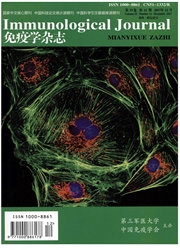

 中文摘要:
中文摘要:
多发性骨髓瘤(MM)系血液系统的恶性肿瘤,以老年人多见。目前治疗以化疗和自身干细胞移植为主,仍难以治愈。多发性骨髓瘤的进展涉及到一系列基因和骨髓微环境的改变,这些改变恰好促进了肿瘤细胞的生长并瓦解了局部的免疫反应。CD4+和CD8+T细胞在多发性骨髓瘤患者体内数量和功能的改变都已经阐明。Treg细胞和Th17细胞的平衡在维持多发性骨髓瘤患者的抗肿瘤免疫中起着至关重要的作用。Treg细胞负责维持机体对外来抗原和自身抗原的免疫耐受。Th17细胞主要参与机体抵抗真菌和寄生虫感染、炎症反应和自身免疫。多发性骨髓瘤患者体内TGF-β和IL-6高水平表达,并可直接或通过其他促炎因子影响Th17细胞的分化,进而调节机体的抗肿瘤免疫应答。因此我们针对Treg细胞和Th17细胞在多发性骨髓瘤中的研究进展进行阐述。
 英文摘要:
英文摘要:
Multiple myeloma (MM)is a malignant tumor of hematological system, and common in elderly. MM remains an incurable disease with chemotherapy and autologns stem cell transplantation (SCT). A series of genetic alterations and changes in the are involved in the development of MM, helping the growth of tumor cells and failure of local immune response. There are detailed description of quantitative and functional changes in Mmpatients. Treg cells and Th17 cells both play an important role in mainting the anti-tumor immtmity in MM. Treg cells play an important role in the maintence of self-tolerance towards self-antigen and external antigen. Th17 cells protect hosts to resist fungal and parasitic infections, and to participate in both autoimmunity and inflammatory reactions. TGF-β and R,-6 are highly expressed in MM, and then have influence on generation of Th17 cells directly or via other pro-inflammatory cytokines, and thereby regulate the anti-tumor immunity. Therefore we demonstrate the new development of Treg cells and Th17 cells in treatment of multiple myeloma.
 同期刊论文项目
同期刊论文项目
 同项目期刊论文
同项目期刊论文
 Dissection of a circulating and intrahepatic CD4(+)Foxp3(+) T-cell subpopulation in chronic hepatiti
Dissection of a circulating and intrahepatic CD4(+)Foxp3(+) T-cell subpopulation in chronic hepatiti Activated IL-23/IL-17 pathway closely correlates with increased Foxp3 expression in livers of chroni
Activated IL-23/IL-17 pathway closely correlates with increased Foxp3 expression in livers of chroni 期刊信息
期刊信息
